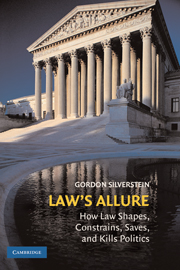Book contents
- Frontmatter
- Contents
- Acknowledgments
- LAW'S ALLURE
- Introduction: Law's Allure: The Juridification of American Politics and Public Policy
- PART I LAW'S ALLURE: WHY, WHY NOW, AND WHY IT MATTERS
- PART II LAW'S ALLURE: PATTERNS, PROCESS, AND CAUTIONARY TALES
- 4 Poverty and Abortion: The Risks and Rewards of a Judicial Strategy
- 5 Environmental Regulation: A Constructive Pattern
- 6 Campaign Finance: A Deconstructive Pattern
- 7 The Separation of Powers: When the Court Says Yes – and No
- 8 War Powers and Precedent: When the Court Is Reluctant to Intervene
- PART III LAW'S ALLURE: COSTS AND CONSEQUENCES
- Conclusion: The Promise and Peril of Law's Allure
- Bibliography
- Index
- References
7 - The Separation of Powers: When the Court Says Yes – and No
Published online by Cambridge University Press: 05 June 2012
- Frontmatter
- Contents
- Acknowledgments
- LAW'S ALLURE
- Introduction: Law's Allure: The Juridification of American Politics and Public Policy
- PART I LAW'S ALLURE: WHY, WHY NOW, AND WHY IT MATTERS
- PART II LAW'S ALLURE: PATTERNS, PROCESS, AND CAUTIONARY TALES
- 4 Poverty and Abortion: The Risks and Rewards of a Judicial Strategy
- 5 Environmental Regulation: A Constructive Pattern
- 6 Campaign Finance: A Deconstructive Pattern
- 7 The Separation of Powers: When the Court Says Yes – and No
- 8 War Powers and Precedent: When the Court Is Reluctant to Intervene
- PART III LAW'S ALLURE: COSTS AND CONSEQUENCES
- Conclusion: The Promise and Peril of Law's Allure
- Bibliography
- Index
- References
Summary
Many who study the courts and the role of judges in politics and policymaking limit their examination to those areas in which judges seize control of policy choices – or have that control thrust on them. But that is only part of the story of law's allure. Juridification, as it is used here, means not only the use of courts to solve policy problems but also the ways in which legal reasoning, legal frameworks, judicial language, and legal forms have come to shape and constrain the political process itself.
Constitutional ambiguity has its virtues, but it also has its vices. “The doctrine of the separation of powers.” Justice Louis Brandeis said, “was adopted by the Convention of 1787, not to promote efficiency but to preclude the exercise of arbitrary power.” It was not, Justice Felix Frankfurter noted, a scheme of government well designed to act with “complete, all-embracing, swiftly moving authority.” Ambiguity was unavoidable in such a complicated system. And ambiguity was the lubrication that allowed the system to adjust, making it possible, but not easy, to act. But ambiguity can also lead to profound friction and conflict that, in turn, can prevent essential government action. It creates loopholes and gaps, which provide opportunities for exploitation and abuse.
In the wake of the urban unrest of the 1960s, the failure of the effort to end the Vietnam War, and then Watergate, there was a great demand for major reform and a growing conviction that the system simply was no longer capable of solving key problems through the ordinary political process of negotiation, bargaining, and elections.
- Type
- Chapter
- Information
- Law's AllureHow Law Shapes, Constrains, Saves, and Kills Politics, pp. 175 - 208Publisher: Cambridge University PressPrint publication year: 2009



